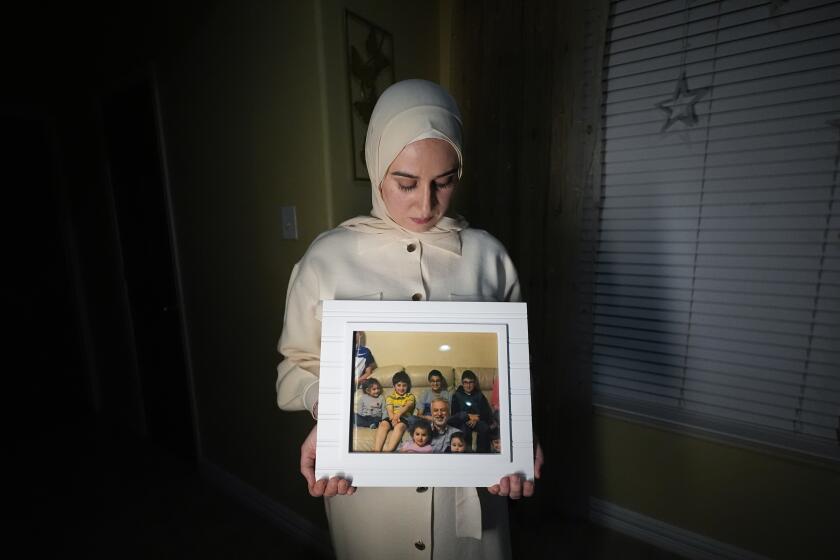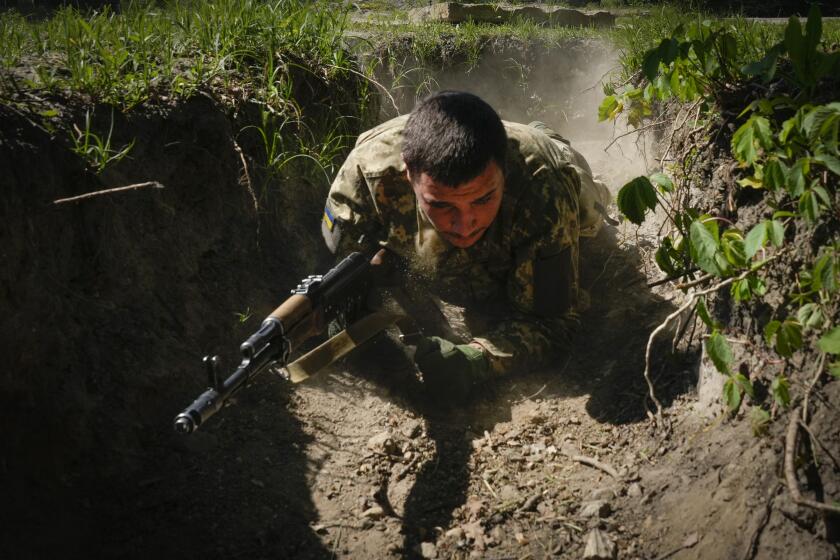Ancestral Land in Harm’s Way
For all of her 89 years, Marie Dean has lived in the bayous of coastal southeastern Louisiana. And for as long as anyone her age can recall, this was the home of the United Houma Nation, one of several Indian tribes that have inhabited this land for generations.
But over the past years, flooding from hurricanes has eroded the land of Dean’s family, forcing them and hundreds of other Indians to keep moving to higher ground -- gradually inching away from ancestral lands.
Dean’s home of 50 years had been flooded twice in the past, and this year hurricanes Katrina and Rita delivered fresh blows.
But the white-haired Dean refuses to be pushed out. “It’s very important,” Dean said of the land that was home to her people long before European colonists arrived. She speaks only colonial French, so a neighbor interpreted. “We had more land, but it’s all washed away.”
Together with the Houma, thousands of members of at least five Indian tribes in southern Louisiana were affected by the hurricanes. They include various bands of the Biloxi-Chitimacha, as well as Muskogees.
“There’s been a total devastation of homes, communities, jobs and lifestyle,” said Brenda Dardar Robichaux, principal chief of the United Houma Nation.
Many people were displaced and found shelter with relatives and friends in the region. Others had no choice but to move back to water-damaged homes.
Tribal leaders said it was important that their members remained near ancestral land, and worried that many might eventually be forced to move away. Hurricanes, they said, threatened to erode not only their land, but age-old community ties as well.
“We feel like we’ve got to get our people home to rebuild, because if we don’t, we lose a part of our history; we lose a part of our culture; we lose a part of who we are as Houma people,” said Robichaux.
She estimated that at least half of the tribe’s 16,000 members were affected by the storms. They were residents of several urban New Orleans parishes, and many lived in the bayous.
To keep the community intact, Robichaux said, the tribe was seeking to purchase a tract of land on higher ground, in any of the areas of Louisiana that her nation once called home.
“People have just gotten to a point now where there’s not really much they can do, apart from just getting out of that community altogether,” said Joby M. Dion, 28, a member of the Biloxi-Chitimacha. He recalled how as a child his family moved at least three times to escape storm-related flooding from the bayous around Dulac.
Dion now lives in Memphis, Tenn., but has been making trips to the area where he grew up to donate supplies and help community members jump-start their lives.
A team of volunteers, some from California, are helping to rebuild the elderly Dean’s home. The workers have cleared the mud that caked her floors, ripped out the drenched interior walls to install insulation -- the first the house has had -- and are working on plumbing repairs.
Others who live in this rural enclave, set along alligator-infested waterways and dotted with rickety single-story houses and trailers, are less lucky. Their homes are uninhabitable.
Marlene Foret, chairwoman of the Grand Caillou/Dulac Band of Biloxi-Chitimacha Confederation of Muskogees, said almost all of the tribe’s 1,200 registered members had hurricane damage to their homes or to their shrimp boats, crab ponds or oyster gardens. Many Indians in the region depend on the fishing industry for their economic survival.
“I’m hoping and praying that people don’t move, but if they do, I can’t say I blame them,” Foret said. But, she added, “I tell them: I understand if you want to move away -- to move to higher ground -- but you must remember where you came from.”
Ronald Feet’s trailer is surrounded by woods and is a stone’s throw from Bayou Guillaume, near Dulac, where he fished as a boy. Floodwaters filled the structure and left mounds of sludge when they receded. Visitors now encounter thick mud tiles at the trailer’s door.
For weeks, 55-year-old Feet, a Biloxi-Chitimacha, had not dared to venture inside.
“It’s totaled,” the boat captain said recently as he peered through the trailer’s murky windows and tried to force open the door.
Feet moved in with his mother in Houma, 20 miles north, but said he planned to return to build a cabin 10 feet off the ground on stilts.
His brother lives in a trailer 50 yards away, a cousin lives next door to him, and another relative occupies the house where Feet’s mother grew up, at the end of the street.
“It’s sort of ... longevity,” said Feet. “It’s all family. I will be back.”
Although recognized by Louisiana as legitimate Indian tribes, groups such as the Houma and various Biloxi-Chitimacha bands lack federal recognition.
Recognition establishes a formal government-to-government relationship between the United States and an Indian tribe. Federally recognized tribes are eligible for federal assistance.
State recognition rarely offers the same level of benefits as federal recognition, tribal leaders said.
Foret and Robichaux said they believed that aid from the Federal Emergency Management Agency had been slow in coming because the tribes did not have federal recognition. The leaders, who said their groups were petitioning for federal recognition, said only a handful of their members had received financial assistance from FEMA.
“Until now, they’ve been playing the FEMA waiting game,” said Dion of the Biloxi-Chitimacha.
A FEMA official denied any discrimination in providing assistance to individuals.
“Every citizen of the state of Louisiana receives help from FEMA whether he is from a federally recognized tribe or a state-recognized tribe,” said Joseph Hesbrook, FEMA’s tribal liaison, who is temporarily based in Baton Rouge.
Community members have banded together to help themselves.
In Raceland, 30 miles north of Dulac, the Houma have set up a relief center on the site of an old general store.
Donations of clothes, linens, canned food, and cleaning supplies have poured in from Indians and others nationwide.
Some volunteers have pitched brightly colored tents on the front lawn of Robichaux’s home. Others are staying in her finished basement or have moved into spare rooms upstairs.
At dawn, they disperse to deliver medical aid or to help with construction.
“It’ been a grass-roots effort,” said Robichaux. “What we have is a whole bunch of people from across the United States coming to help.”
Luana Horstkotte, 48, who is Choctaw on her mother’s side, flew from Martinez, Calif., to volunteer. She has been helping to clean and renovate Dean’s home.
“I couldn’t believe that something so devastating was happening here,” said Horstkotte, a civil rights lawyer. “Whether it was Native Americans or not, something needed to be done.”
Tricia Mora, vice chairman of the federally recognized Chitimacha Tribe of Louisiana, said her community had taken in about 80 tribal members on its reservation in Charenton, La., about 83 miles northwest, after the storms.
One family with children has decided to remain on the reservation, Mora said. To her, their move as a result of Katrina was a blessing in disguise.
“They will get to be with their elders, be it true family relations or just an elder down the road,” the tribal leader said. “We will be able to teach them about their culture.”
More to Read
Start your day right
Sign up for Essential California for news, features and recommendations from the L.A. Times and beyond in your inbox six days a week.
You may occasionally receive promotional content from the Los Angeles Times.







